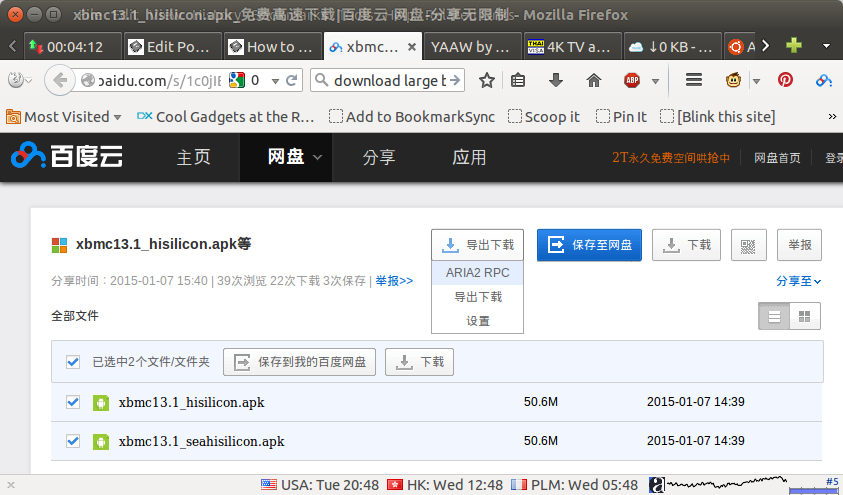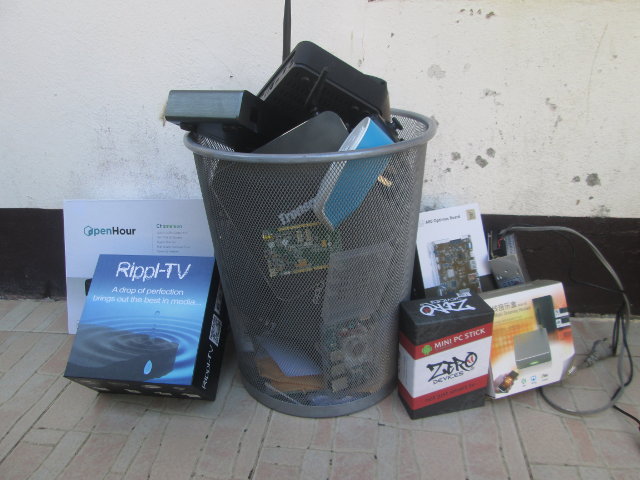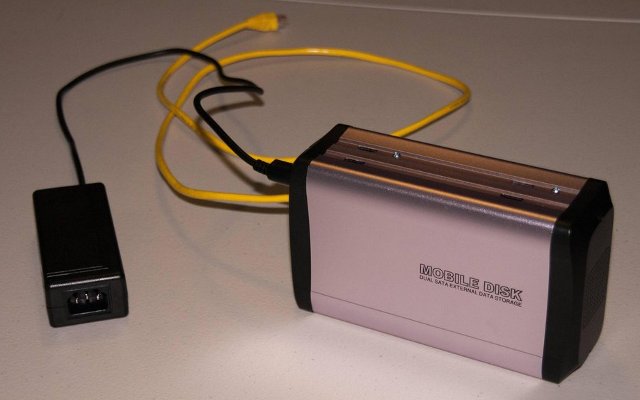I’ll combine two unrelated short news about software releases for TV boxes, Raspberry Pi, and other SBCs: Kodi 20 “Nexus” Alpha 1 media center, and DietPi 8.5 lightweight Debian-based image for SBC’s. Kodi 20 “Nexus” Alpha 1 The first alpha release of Kodi 20 “Nexus” is out with one highlight being support for AV1 hardware video decoding in Android and x86 (VAAPI) platforms with AV1-capable GPU or VPU. Other notable changes include: FFMPEG upgraded to version 4.4 Plenty of subtitle related changes: Added Steam Deck built-in controller support Initial support for M1 native including native windowing/input handling Pipewire support in Linux Various PVR improvements including in terms of performance when a large number of channels is displayed You’ll find more details in the announcement. The RetroPlayer project based on Kodi, but adding some game-related features, has also released some test images based on Kodi 20. Note that since it’s an […]
Downloading Files on Baidu, or via HTTP, Bittorrent or Metalink in Linux with BaiduExporter, Aria2 and YAAW
Most firmware files distributed by the manufacturers are uploaded to Baidu, but I’ve found the service not to be always reliable, especially for larger files. In Windows, people are recommended to use Baidu software (BaiduYunGuanjia), but there’s not such tool in Linux, so instead I investigate for command lines tools to download files from Baidu, and this lead me to two interesting tools called Aria2, a “lightweight multi-protocol & multi-source command-line download utility. It supports HTTP/HTTPS, FTP, BitTorrent and Metalink”, and YAAW “Yet Another Aria2 Web Frontend” with allow to start and monitor download locally or remotely. But let’s start with the first tool I found: pan-baidu-download, a Python script to download files from Baidu. To install it:
|
1 2 |
git clone https://github.com/banbanchs/pan-baidu-download.git cd pan-baidu-download |
We also need to install some dependencies (assuming python 2.7.x is already installed):
|
1 |
sudo apt-get install python-pip aria2 |
and then you can start downloading files as follows:
|
1 |
python bddown_cli.py download http://pan.baidu.com/s/somerandomcharacters |
But after posting a bug about password-protected […]
What Do You Do with Your Old Devices and Boards?
New and faster processors and products come out regularly, and prices have come down so much that people are likely to discard old devices, or let them collect dust, as new devices can be bought for half the price you bought your now sluggish single or dual core mini PC, remember CX-01?, last year or two. However, people may not like to through perfectly usable product by principle, while others may be concerned by the pollution effects of our consumerism, and craze for the latest gadgets. There must surely things that can be done instead of simply trashing old devices. I’ll give some ideas mostly for mini PCs, but since a group of person is smarter than one only, I’m sure I get some interesting input. Give your old devices to friends of family. Downside: they may never used it themselves either. Sell your device on Ebay or other websites. […]
QNAP TS-x51 NAS Supports Up to 16 Drives, On-the fly HD Video Transcoding, HDMI Output, Virtualization and More
QNAP has introduced their latest TS-x51 NAS family at Computex 2014 with four NAS supporting between 2 to 8 drives, expandable to a total of 16 drives via expansion enclosures. The storage devices powered by an Intel Celeron J1800 dual core processor boast video transcoding capability that’s 18 times faster than earlier Atom based solutions, feature an HDMI port, and support virtualization to allow you to run two operating systems such as Linux and Windows 8. QNAP TS-x51 specifications: SoC – Intel Celeron J1800 dual core processor @ 2.41 GHz (burst frequency: 2.58) with Intel HD graphics System Memory – 1GB SO-DIMM DDR3L-1333 or 4GB SO-DIMM DDR3L-1333 (Each model listed above has 1GB or 4GB RAM options), expandable to 8GB RAM via a second RAM slot Storage 512 MB flash (DOM – Disk On Module) Hot swappable 2.5″ or 3.5″ SATA drives @ 6Gb/s, 3Gb/s. Expansion enclosures – UX-800P, or UX-500P RAID […]
DIY NAS Enclosure for The Cubieboard
The Cubieboard with a 1GHz processor, 1GB RAM, a SATA port and its low price ($49) is probably one the best available options if you want to make your own ARM based NAS. The hardware is easy to get, most of the software components (Linux, SAMBA/NFS server, Bittorrent client, etc…) are available, but there are no NAS enclosure available for the Cubieboard, so this part may be a little tricky. Cubieforums user Vustus has a pretty neat and cost- effective solution for an enclosure based on off-the-shelf parts. If you want to try it yourself, you’ll need the following parts: 3.5″ USB 2.0 aluminum external dual SATA HDD enclosure ($15) – http://www.geeks.com/details.asp?InvtId=ET-3541S 10″ Flat SATA cable ($2.49) – http://www.newegg.com/Product/Product.aspx?Item=N82E16812119365 SATA Y cable for power ($4.99) – http://www.newegg.com/Product/Product.aspx?Item=N82E16812198015 Power cable for th Cubieboard (taken from PSP power supply, as a cable would cost about $7 according to vustus) ($4.29) – http://www.amazon.com/gp/product/B002TK3GH8 […]
How to Allow Apps To Write Files to USB Mass Storage Devices in Android
When you’ve got an Android media player or mini PC, you may want to connect an external USB drive and allow write access to this drive to some applications. However, this is disabled by default in Android, although file managers appear to allow copy/paste of files to those drives without issue. Some applications may even refuse to install if they can’t find writable SD card or USB mass storage device. I’ve tried to install the latest version of aTorrent (version 1.7.6) in my Mele A1000, and it could not install at all and returned a message like: Can’t install on SD card or USB device The solution below is adapted from a solution on XDA Developers Forums. Some instructions tells you to use an app such as Root Explorer to edit the files in Android (ES File Manager will also do, after allowing “Up to Root” option), but I personally […]
How To Create and Seed a Torrent in Ubuntu Using Transmission Command Line
You may have a server with limited (free) monthly bandwidth, but yet need to share some large files or files that need to be accessed by a large number of people. Instead of sharing your files via your HTTP server, you can share them via BitTorrent instead in order to hopefully save bandwidth. Here are the steps I followed on Ubuntu 11.10, but they should work with any version of Ubuntu, Debian and Mint. Install transmission client and daemon
|
1 |
sudo apt-get install transmission-cli transmission-daemon |
Create a directory to share your files and .torrent files
|
1 |
mkdir ~/p2p |
Copy your file in that directory and create the torrent file with transmission-cli
|
1 |
transmission-create ubuntu.bin.7z -t udp://tracker.openbittorrent.com:80 |
Start transmission-daemon
|
1 |
transmission-daemon -c ~/p2p |
That’s all your need to do. If you want to monitor transmission remotly via a web interface, you can instead run transmission-daemon as follows: transmission-daemon -c ~/p2p -a public_ip Where public_ip is the public ip of your computer. Alternatively, you could also […]
P2P for embedded systems: BitTorrent and Emule – Part 2
In part1, I explained how to build and install aMule for mips platorm, in part2, we’ll build and install Transmission BitTorrent client for devices based on Sigma Designs SMP8634/SMP8635. Transmission BT is already used in quite a few NAS and media players including Syabas Networked Media Tank, Western Digital WD MyBook, ReadyNAS, D-Link DNS-323 & CH3SNAS… as you can see at the bottom of the transmission download page. Building Transmission 2.13 daemon and client First download Transmission 2.13 source code and required dependencies: OpenSSL 1.0.0c, cURL 7.21.3 and libevent 1.4.14b (do not use libevent 2.0.x). You’ll also need zlib 1.2.5 that we compiled in part1. Extract them: tar xjvf ../Downloads/transmission-2.13.tar.bz2 tar xzvf ../Downloads/openssl-1.0.0c.tar.gz tar xjvf ../Downloads/curl-7.21.3.tar.bz2 tar xzvf ../Downloads/libevent-2.0.9-rc.tar.gz Build OpenSSL 1.0.0c: ./Configure no-asm –prefix=/home/jaufranc/edev/libs linux-generic32 make CC=”mipsel-linux-gcc” AR=”mipsel-linux-ar r” RANLIB=”mipsel-linux-ranlib” make install Build cURL 7.2.13: ./configure –prefix=/home/jaufranc/edev/libs –build=mipsel-linux –target=mipsel-linux -host=i686 –disable-ipv6 –without-random –with-ssl=/home/jaufranc/edev/libs –with-zlib=/home/jaufranc/edev/libs CC=mipsel-linux-gcc LDFLAGS=-ldl make make install […]









